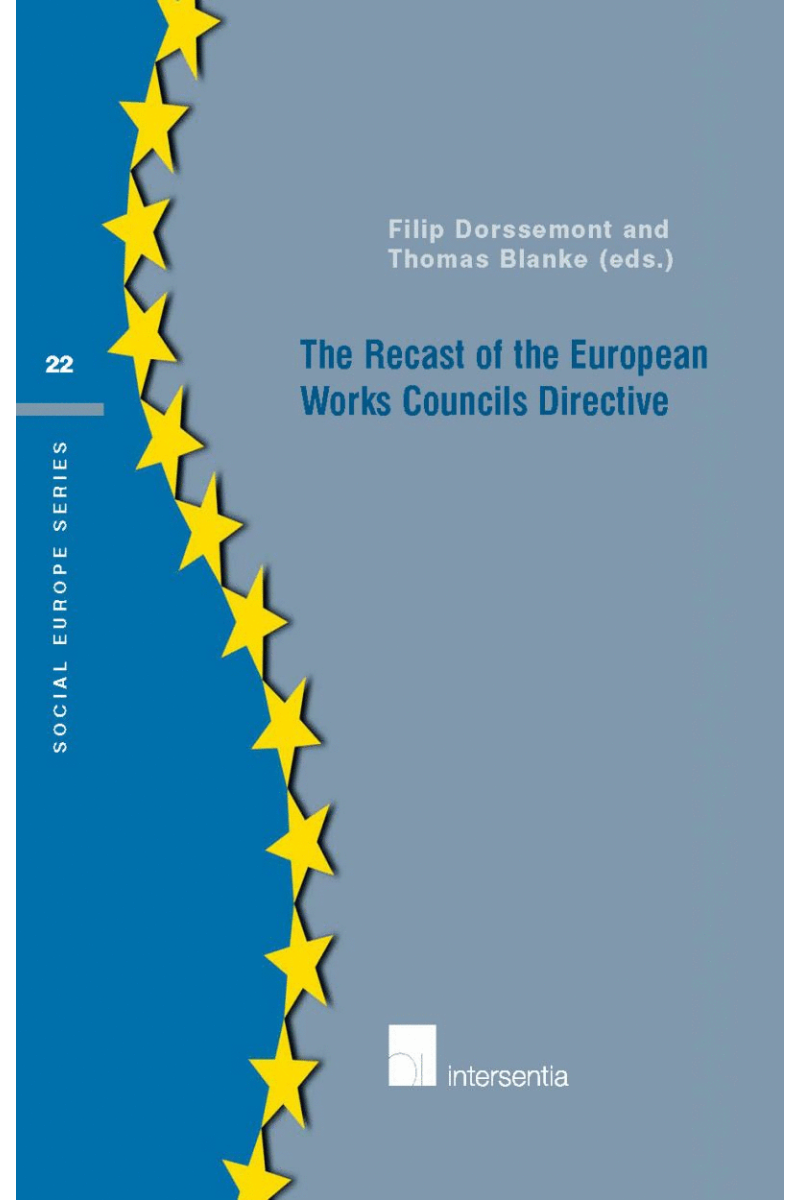 maestro
mastercard
visa
maestro
mastercard
visa

The Recast of the European Works Council Directive

On 16 May 2009, the EC Directive 2009/38 (Recast Directive) was published in the Official Journal. With effect from 6 June 2011, the EC Directive 94/45 on the establishment of a European Works Council or a procedure in Community-scale undertakings and Community-scale groups of undertakings for the purposes of informing and consulting employees (EWC Directive) will be repealed. It will be substituted by the Recast Directive.
The present volume is retrospective and prospective. The book unfolds as a diptych. The first part examines the background and some of the loopholes of the EWC Directive. The background is being studied from a conceptual, a historical, a legislative and a case law perspective. A substantial part of the first panel of the diptych is dedicated to an analysis of the ECJ and domestic case law related to the EWC Directive. This research was operated on the basis of national reports following a questionnaire or format annexed to the book. The national reports (Austria, Belgium, France, Germany, the Netherlands, Slovakia, Sweden and the UK), which have been updated until the end of 2009, as well as a comparative or synthetic report have been integrated in this publication.
The second part does not endeavour a systematic analysis of the Recast Directive. It gathers selected essays which have been written by distinguished scholars as well as by experts who have combined a profound knowledge of law in the books with the experience of law in practice. Some of the essays have a topical character. They focus on specific improvements of the Recast Directive (the scope ratione temporis, the nature of the recast procedure, the definitions of information and consultation, the issue of continuity, the articulation between European and local information and consultation procedures). Other authors have tackled the subject matter in a more comprehensive manner, though they have done so from a specific and distinct perspective (e.g. the issue of effectiveness, the issue of actors).
‘[A] very complete and original analysis of the European Works Council (EWC) Directive.’
Sylvaine Laulom in 2011 E.L. Rev. 758
‘[the book] offers a read-worthy analysis of the problems in the application of the original Directive on Works Councils and its national implementation.’
Martin Franzen in 2011 EuZA 290.
| Type of product | Book |
|---|---|
| Format | Paperback |
| EAN / ISSN | 9789400000759 |
| Series name | Social Europe Series |
| Weight | 726 g |
| Status | Available |
| Number of pages | xxx + 420 p. |
| Access to exercice | No |
| Publisher | Intersentia |
| Language | English |
| Publication Date | Jun 22, 2010 |
| Available on Strada Belgique | No |
| Available on Strada Europe | No |
| Available on Strada Luxembourg | No |
Downloads
- Table of Contents
- A. Background and loopholes of the EWC Directive 94/45
- 1. The fundamental right of workers to information and consultation under the European Social Charter
Csilla Kollonay Lehoczky - 2. Worker involvement in secondary EC law prior to the Recast Directive
Filip Dorssemont - 3. The first test of the Maastricht Social Protocol: European works councils
Jon Erik Dolvik - 4. The EWC in domestic and ECJ case law- I. European works councils related litigation – Rationale for a systematic analysis
Romuald Jagodzinski - 4. The EWC in domestic and ECJ case law- II. National reports - Austria
Domenico Rief - 4. The EWC in domestic and ECJ case law- II. National reports - Belgium
Filip Dorssemont - 4. The EWC in domestic and ECJ case law- II. National reports - France
Rachid Brihi - 4. The EWC in domestic and ECJ case law- II. National reports - Germany
Thomas Blanke - 4. The EWC in domestic and ECJ case law- II. National reports - The Netherlands
Robbert van het Kaar - 4. The EWC in domestic and ECJ case law- II. National reports - Slovak Republic
Maria Svorenova - 4. The EWC in domestic and ECJ case law- II. National reports - Sweden
Magnus Lundberg - 4. The EWC in domestic and ECJ case law- II. National reports - United Kingdom
Pascale Lorber - 4. The EWC in domestic and ECJ case law- III. The European Works Council Directive and the domestic Courts. A critical analysis of the legal issues at stake
Filip Dorssemont - 4. The EWC in domestic and ECJ case law- IV. Format for the national reports related to EWC case law
Filip Dorssemont - B. The Recast of the EWC Directive (2009/38)
- 1. Straightjacketing, time travelling and unifying: The multiple impact of the recast European Works Council Directive
Séverine Picard - 2. Review, revision or recast? The quest for an amended EWC Directive
Romuald Jagodzinski - 3. Information and consultation in the Recast Directive
Corinne Sachs-Durand - 4. Who is first? The correct timing of information and consultation of European works councils in relation to national rights of worker involvement
Thomas Blanke, Edgar Rose - 5. EWC’s role recast: A European actor?
Josée Lamers - 6. Can the Recast Directive bring more and more effective EWCs?
Peter Kerckhofs